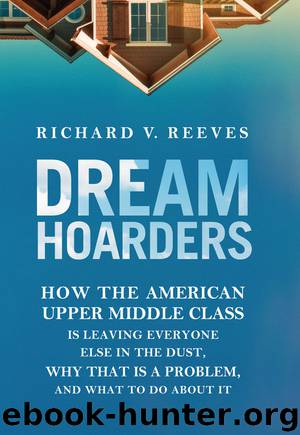Dream Hoarders: How the American Upper Middle Class Is Leaving Everyone Else in the Dust, Why That Is a Problem, and What to Do about It by Richard V. Reeves & Richard V. Reeves

Author:Richard V. Reeves & Richard V. Reeves [Reeves, Richard V.]
Language: eng
Format: azw3
Publisher: Brookings Institution Press
Published: 2017-05-23T04:00:00+00:00
FIGURE 6-1 The $70 Billion Benefit: Tax Deductions for Affluent Homeowners
Source: Urban Institute, “Who Benefits from Asset-Building Tax Subsidies,” September 2014 (www.urban.org/sites/default/files/alfresco/publication-pdfs/413241-Who-Benefits-from-Asset-Building-Tax-Subsidies-.PDF). Data tabulated for 2013.
The IRS is generous when we sell our expensive homes too, giving us a break from any tax on capital gains. Half the value of this tax break goes to those of us in the top income quintile. Thanks, Uncle Sam!
So, those of us with high earnings are able to convert our income into wealth through the housing market, with assistance from the tax code. We then become highly defensive—almost paranoid—about the value of our property and turn to local policies, especially exclusionary zoning ordinances, to fend off any encroachment by lower-income citizens and even the slightest risk to the desirability of our neighborhoods. These exclusionary processes rarely require us to confront public criticism or judgment. They take place quietly and politely in municipal offices and usually simply require us to defend the status quo.
As well as the obvious economic implications, this segregation may create other, less tangible inequalities, too. When all our neighbors are like us, there is a danger that we end up living in a bubble. Economic sorting at the neighborhood level leads to social sorting in terms of schools, churches, and community groups. This means fewer interactions and social ties across social classes.18 A geography gap can become an empathy gap.
The debate over zoning brings two American values into conflict: local control and economic mobility. There is much to admire in the decentralized nature of political power in the United States. Bringing power closer to voters makes for a more democratic culture in general. But the downsides are clear, too, especially when local regulations, taken in aggregate, can have such a significant impact on national issues like growth, migration, inequality, and intergenerational mobility. At some point, healthy local democratic processes morph into unfair opportunity hoarding mechanisms. This is when it becomes necessary for more distant political institutions, including state and federal government, to intervene in the pursuit of these social welfare goals (on which there is more in the next chapter).
Download
This site does not store any files on its server. We only index and link to content provided by other sites. Please contact the content providers to delete copyright contents if any and email us, we'll remove relevant links or contents immediately.
International Integration of the Brazilian Economy by Elias C. Grivoyannis(57424)
The Radium Girls by Kate Moore(10929)
Turbulence by E. J. Noyes(7062)
Nudge - Improving Decisions about Health, Wealth, and Happiness by Thaler Sunstein(6648)
The Black Swan by Nassim Nicholas Taleb(6215)
Pioneering Portfolio Management by David F. Swensen(5620)
Rich Dad Poor Dad by Robert T. Kiyosaki(5174)
Zero to One by Peter Thiel(4841)
Man-made Catastrophes and Risk Information Concealment by Dmitry Chernov & Didier Sornette(4756)
Secrecy World by Jake Bernstein(3793)
Millionaire: The Philanderer, Gambler, and Duelist Who Invented Modern Finance by Janet Gleeson(3579)
Skin in the Game by Nassim Nicholas Taleb(3489)
The Age of Surveillance Capitalism by Shoshana Zuboff(3436)
The Money Culture by Michael Lewis(3297)
Skin in the Game: Hidden Asymmetries in Daily Life by Nassim Nicholas Taleb(3280)
Bullshit Jobs by David Graeber(3194)
The Dhandho Investor by Mohnish Pabrai(3181)
The Wisdom of Finance by Mihir Desai(3093)
Blockchain Basics by Daniel Drescher(2902)
